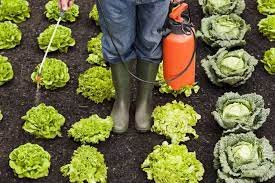Produce vs. Pesticides: Guide to Grocery Shopping
Happi Healthi Yogi here! Today we are going to discuss all things produce and pesticides. The produce aisle is Mother Nature’s candy store. It’s the most colorful and nutrient-packed to efficiently fuel your body. But, every party has a pooper and this one is pesticides. Pesticides are inevitable when it comes to grocery shopping, but we are going to break down the best and worst of the bunch. I’m here to help you understand what organic means, when to avoid pesticides, and what pesticides can do to your body.
Fruits and vegetables decrease inflammation, provide numerous vitamins and minerals, have anti-aging benefits, and reduce the risk for chronic diseases. To make sure we reap the full benefits of produce we need to be aware of pesticides to limit our exposure to harmful chemicals.
Pesticides were produced to eliminate insects and control weeds and pests during the growth of the crops. While it sounds harmless and practical, these chemicals seep into the plant, dilute the nutrients, and worst of all, hurt your body.
Pesticides are silent but deadly. Their presence in our environment has been linked to some of the following health problems:
- Cancer
- Brain and nervous system toxicity
- Skin, lung, and eye irritation
- Hormone disruption
Pesticides target the communicator of the body, the nervous system – and the nervous system must be protected at all costs.
Choosing organic is the easiest way to avoid these evil chemicals and prevent the disruption of our bodies’ natural communication pathways. In case you were curious, the definition of Organic means “the relating to, yielding, or involving the use of food produced with the use of feed or fertilizer of plant or animal origin without employment of chemically formulated fertilizers, growth stimulants, antibiotics, or pesticides”. Unfortunately, most often it's almost impossible to be completely rid of these chemicals, but by buying organic we eliminate over 90%.
I don’t know about you, but I’m just a gal on a budget. I don’t want to buy organic for every piece of produce, but I also want to ensure that I’m not ingesting chemicals where I can. Luckily, there’s a cheat sheet to show us what is a must when it comes to buying organic. It’s called “The Dirty Dozen”. For this bunch, it’s crucial to buy organic because they absorb the highest amount of chemicals, and when not bought organic, provide no nutritional benefit because the chemical harm level outweighs the nutritional density of the produce. Without further ado, I give you the dirty dozen:
1. Apples
2. Sweet/ Hot Bell Peppers
3. Peaches
4. Strawberries
5. Nectarines
6. Grapes
7. Lettuce/ Kale/ Collard greens
8. Blueberries/ Blackberries/ Raspberries
9. Pears
10. Cherries
11. Green Beans
12. Spinach
PSA: Berries and strawberries absorb a higher level of pesticides than the other produce in the dirty dozen. Their thin skin provides almost no barrier to the chemicals. Your conventional blueberry contains at least 52 pesticides when not bought organic. So when in doubt, buy organic berries or just skip them altogether if that is not an option.
Another thing to keep In mind is that these lists change yearly based on farming supplies and technique updates. What might have been considered in the Dirty Dozen in 2021 might not be considered as harmful today. For example, tomatoes, cucumbers, potatoes, and celery used to be on the list but have now been replaced with other produce that today use more chemicals in the harvesting process. This is another reason that avoiding chemicals altogether is so difficult. Keeping up with the annual Dirty Dozen list is what I would recommend for effectively avoiding pesticides.
Now that we know what produce requires the big bucks, let’s talk about the ones you can avoid paying extra for. These are called “The Clean 15”. Their rinds and external barriers are thicker and protect the produce from the chemicals more efficiently. That means we can save a few dollars when making our grocery runs. Allow me to introduce the clean 15:
1. Asparagus
2. Avocados
3. Cabbage
4. Onions
5. Honeydew Melons
6. Kiwi
7. Mango
8. Papaya
9. Pineapples
10. Sweet Corn
11. Sweet Peas
12. Mushrooms
13. Sweet Potatoes
14. Watermelon
15. Carrots
The same tip goes for the Clean 15. Make sure you are keeping up with the yearly list for ‘cleanest produce’ as they evolve over time based on farming practices. Broccoli, bananas, eggplant, and cauliflower all used to be considered ‘clean’ and have been replaced over the years. Personally, I still buy bananas that are not organic because their rind is so thick. Use these lists as a guide, but if budget is a factor, use your best judgment.
Produce is vital for a healthy whole-food diet. They are the best method for getting our necessary vitamins and minerals. When consumed consistently, produce helps protect you from diabetes, heart disease, and cancer by balancing your blood sugar levels.
Swap chemicals for nutrients by paying attention to the dirty dozen next time you’re doing a grocery run, and save money on the clean fifteen. I hope you learned something that can benefit your health and wallet today.
Namaste Friends.



